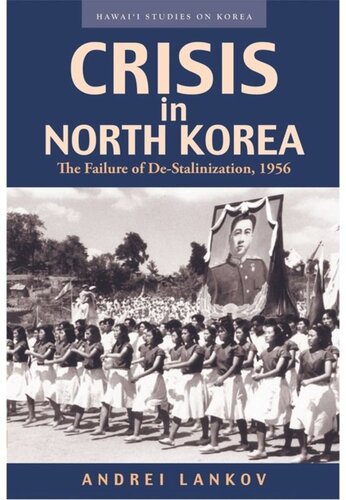

Most ebook files are in PDF format, so you can easily read them using various software such as Foxit Reader or directly on the Google Chrome browser.
Some ebook files are released by publishers in other formats such as .awz, .mobi, .epub, .fb2, etc. You may need to install specific software to read these formats on mobile/PC, such as Calibre.
Please read the tutorial at this link: https://ebookbell.com/faq
We offer FREE conversion to the popular formats you request; however, this may take some time. Therefore, right after payment, please email us, and we will try to provide the service as quickly as possible.
For some exceptional file formats or broken links (if any), please refrain from opening any disputes. Instead, email us first, and we will try to assist within a maximum of 6 hours.
EbookBell Team

0.0
0 reviewsNorth Korea remains the most mysterious of all Communist countries. The acute shortage of available sources has made it a difficult subject of scholarship. Through his access to Soviet archival material made available only a decade ago, contemporary North Korean press accounts, and personal interviews, Andrei Lankov presents for the first time a detailed look at one of the turning points in North Korean history: the country’s unsuccessful attempts to de-Stalinize in the mid-1950s. He demonstrates that, contrary to common perception, North Korea was not a realm of undisturbed Stalinism; Kim Il Sung had to deal with a reformist opposition that was weak but present nevertheless.
Lankov traces the impact of Soviet reforms on North Korea, placing them in the context of contemporaneous political crises in Poland and Hungary. He documents the dissent among various social groups (intellectuals, students, party cadres) and their attempts to oust Kim in the unsuccessful "August plot" of 1956. His reconstruction of the Peng-Mikoyan visit of that year—the most dramatic Sino-Soviet intervention into Pyongyang politics—shows how it helped bring an end to purges of the opposition. The purges, however, resumed in less than a year as Kim skillfully began to distance himself from both Moscow and Beijing. The final chapters of this fascinating and revealing study deal with events of the late 1950s that eventually led to Kim’s version of "national Stalinism." Lankov unearths data that, for the first time, allows us to estimate the scale and character of North Korea’s Great Purge.
Meticulously researched and cogently argued, Crisis in North Korea is a must-read for students and scholars of Korea and anyone interested in political leadership and personality cults, regime transition, and communist politics.